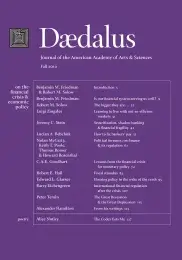The bigger they are...
Any discussion of financial policy and regulation should begin with an urgent reminder that the financial system is a means, not an end. Otherwise, it is all too easy to become wholly engrossed in the hopes and fears, successes and failures, of financial enterprises and the people who love them, as if that were what really matters.
One socially useful function of the financial system is to intermediate between savers and investors. Many diverse individuals, enterprises, and other institutions save–spend less on their current needs than they take in–and it is economically important that their savings be made available to those firms, governments, investors, and other units in the financial system that can make the most profitable (or otherwise valuable) use of such savings. Because most savers lack the information and understanding they would need and because they cannot easily diversify, financial institutions perform this function for them. When something hinders the performance of the financial system, the “real” economy of production and employment suffers. The economy invests too little or too much, or it invests in the wrong industries. If it is true today that many viable businesses are unable to obtain credit on reasonable terms, the system most likely is not functioning well.
The other socially useful function of the financial system is more complicated and recondite. In the course of real economic life, an enormous variety of risks arises. Bank A may have made a large loan to company B, with the survival of both of them depending on the uncertain success of B’s new line of products. A retired couple with no heirs has to allocate their accumulated savings over their uncertain lifetimes; if they spend too much, they may run out of funds and suffer, and if they spend too little, they may die with useless wealth, having skimped their golden years.
Some individuals and institutions don’t mind bearing economic risk because their attitudes, their wealth, the nature of their incomes, or their ability to diversify makes it relatively easy. There are also those whose circumstances make substantial risk-bearing painful or intolerable. The financial system can arrange to transfer many risks from the second group to the first, with appropriate compensation all around. Consequently, the real economy works better. Company C may have the ideas and the skills to undertake something potentially very valuable but cannot bear the inevitable risks; something useful may happen only if the risks can be off-loaded.
. . .
